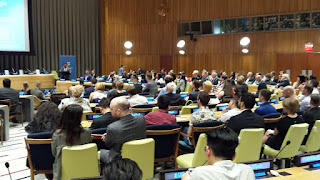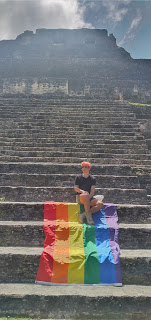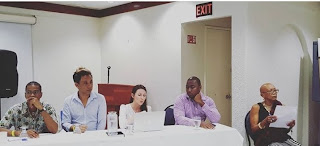OAS General Assembly 2014: UniBAM prospective.
June 7th, 2014

We saw as well the organized nature of the fundamentalists in the room and who spoke. We saw how they were prepared to lie in one instance saying there was consensus on one document between them and the Campaign, but instead pulled out their declaration and spoke to the General Assembly.
Here are some highlights of their presence.
Later that day, we had a dialogue on Human Rights and discrimination at the Sheraton. Present was Tracy Robinson President of the Commission and Rosa-Maria Ortiz, Commissioner responsible for Belize, a Brazilian representative, President of the Aireana Carolina Robledo-a group for the rights of Lesbian and Caleb Orozco. of UniBAM.
Last year in Guatemala, fundamentalist groups clash with a coalition of Afro-descendants, Feminists, LGBTTTI and the Campaign. They argued we had nothing in common, we argued that we did. In Paraguay, the polarization was as intense as the left and far right vy for the attention of the Secretary General at the Civil Society Dialogue on June 3rd, 2014. Alliance Defending Freedom, Yes To Life Guatemala and others asked their questions as well as our coalition. CARIFLAGS representative, helped a Young Guyanese activists Tiffany Barry worked the room to get her questions out as the far right had lots of questions regarding family that only Tiffany could respond to. We move from one side of the room to the next, while our fellow activists from St. Lucia Daryl Williams was able to chat with the microphone holder, long enough to direct his attention to us. Our Latin American activists worked the rooms as intensely as well.
The battle continued later in the day when Ambassador Quinones announced who would speak. A a ruckus of opinions erupted in the room, as folks began to expressed their dissatisfaction about the presence of the family group and being paired with them. We saw who was making the ruckus and it about supporting the idea that the Campaign must have their space. This is important as it defines who speaks at the General Assembly that is the only space for hearing Civil society declarations. During the the dialogue, it was clear that the Secretary General was not going to take a position on abortion and did respond to Tiffany questions. He said essentially, there is a reason why there are two conventions, it was because of the Caribbean who did not want one. He spoke of the 11 countries which criminalizes same sex activity and recognize that more needed to get done to reach out to Caribbean organizations as there was confusion regarding the visa process and getting to Asuncion Paraguay. One of things we realized is that indigenous and Afro-descendant groups were competing for attention of the General Secretary as well.

We saw as well the organized nature of the fundamentalists in the room and who spoke. We saw how they were prepared to lie in one instance saying there was consensus on one document between them and the Campaign, but instead pulled out their declaration and spoke to the General Assembly.
Here are some highlights of their presence.
Later that day, we had a dialogue on Human Rights and discrimination at the Sheraton. Present was Tracy Robinson President of the Commission and Rosa-Maria Ortiz, Commissioner responsible for Belize, a Brazilian representative, President of the Aireana Carolina Robledo-a group for the rights of Lesbian and Caleb Orozco. of UniBAM.
Belize task was to speak about the Caribbean region and that presentation spoke to," CARICOM member states have traditionally believed that because it lacks a history of mass human rights violations that it has the moral standing to say its a better region when compared to Latin countries. It has failed, however, to acknowledge and define either a regional or national position about the dignity and rights of its individual L.G.B.T citizens in any substantive way. States individually and within CARICOM have failed to deliver a clear political, constructive or responsible position in responding to its L.G.B.T citizens. It neither studies violence nor look at legislative laws that discriminate that impact benefits, health, decisions nor impact family situations. It has failed to look at how discrimination affects L.G.B.T Youth. The result in the region and among many states have been complicity, by their inaction in supporting state sanction discrimination. It is time for states to look within and understand that development with exclusion is not an efficient approach , in improving human capital. It is clear that some political leaders have chosen to mix religion with governance. It is time for them to understand silence, indifference and inaction is not governance. There is no true democracy without rights expressed in practice, laws that protect and policy that respect diversity. The solution to solving discrimination, is not delays, its action today, not tomorrow."
Enter June 4th and 5th, where there was the General Assembly with Foreign Ministers, but, few CARICOM member states where in their seats with the exception of the Foreign Minister of Belize, the Trinidadian ambassador.
In his speech to the General Assembly the Belize Foreign Minister spoke of government as the creator of wealth and that its government that corrects inequity. He said that its not the private sector, for they exists to create profit. He goes on to say, “Government, is the Guarantor of All Rights!” and goes on to acknowledge, all Interventions at the General Assembly, including the Latin American and Caribbean LGBTTTI coalition. The statements, follows, the Belize Prime Minister Speech of 2013 that the State will not shirk its responsibilities to all its citizens,” This was important for the coalition because in 7 years of attending the OAS General Assembly, we had not heard him mentioned the coalition. He then, quickly moved to the plenary meeting along with the other countries in the region. Later, we monitored the General Committee decisions on draft resolutions and found that Belize had issued a resolution for the Belize and Guatemala adjacency zone and had gotten 21 co-sponsors. We found out too that Belize did re-issued its footnotes from last year resolution on Human Rights, Sexual Orientation, Gender Identity and Expression.
The fundamentalists were out and we were out, the Belize Ambassador was spoken to more than once, professional man, whose future should be long at the OAS. Spoke to the Foreign Minister as well, who provided an education with respect. Spoke to Antigua and Barbuda, Haiti, Dominica, St. Kitts and Nevis, Trinidadian ambassador, Guyanese Chief Of Mission and St. Lucia Foreign Minister. Now in discussing the footnote with the St. Lucian Foreign Minister, he said that there was " no discrimination or violence" against LGBTI people in his country. In fact, he says they live freely. He did say that he was against violence to be fair. He added," Minority Rights must be protected, but the will of the majority must prevail!"He went on to say that the issue of women and LGBTTTI "is a foreign imposition." I failed to tell him, that when a person who experience abuse and violence the issue is not foreign, its personal. I failed to tell him that when women experience sexual or physical violence that its not a foreign, it personal. He even asked me what does a man and a man or a woman and a women get out of having having children. I apparently did not answer, his question properly and closed with the comment all human being deserve dignity and rights. I did discuss my experiences in Belize around violence and discrimination and that people who have experience an accumulation of discrimination would not necessarily report it to the police and that bully in school and the invisible issues of family violence remains. But it was clear, and it left an impress on me in the following way. Bigots can hide behind title of Ambassador and Foreign Minister titles using the power of the state to ignore, justify, abdicating their responsibility of governance by being guided by their fundamentalists belief. It dawn on me, that political engagement, public education would not be enough in certain countries that litigation is a requirement is advancing the responsibilities of the state. The point is reinforce when he told me, " minority rights must be protected, but the will of the majority must prevail. Suriname, remains a confusing place as well.
Another person I spoke to from another country said, " if CARICOM were to have a common position of L.G.B.T citizens, it would not be in your favor, as we are in the minority!" It clear CARICOM is divided into ideological blocks, conservative, moderately conservative and a few moderate countries.
This is important as work continues to profile each country and to refine political engagements.For this year, we were able to get two less CARICOM states to refrain from footnotes, but the footnotes remain from an unofficial 13 countries with some additions from Latin America. Last year, the footnotes for 2807 resolutions were as follows:
- The Government of Belize is unable to join consensus on this resolution given the fact that several of the issues and principles addressed therein, directly or indirectly, are at present the subject …
- The delegations of Saint Vincent and the Grenadines, Saint Kitts and Nevis, and Dominica are unable to join consensus on the approval of this resolution. Saint Vincent and the Grenadines is of the view that the term “gender expression” …
- Government of Jamaica is unable to join the consensus on the approval of this resolution, given that the terminology of gender expression, as proposed, is ambiguous and has the potential…
- The Government of Barbados is unable to join consensus on the approval of this resolution given that a number of the issues and terms contained in the resolution are neither reflected in its national …
- The Republic of Suriname remains committed to promoting and defending all human rights for all and, based on the principle of equality, under which all who are within …
- The Government of Guyana is unable to join consensus on this resolution given the fact that several of the issues addressed herein are currently the subject of deliberation by a special select …
- The Government of Honduras wishes to state its commitment to human rights and to the international conventions that it has signed to that effect. Furthermore, it does not consider itself …
- Like Saint Vincent and the Grenadines, Saint Lucia is unable to join consensus on the approval of this resolution because the term “‘gender expression”‘ is one that is not thoroughly defined or has …
- the context of existing policy and legislation, the Republic of Trinidad and Tobago is unable to support the resolution. However, Trinidad and Tobago is signatory to the Universal Declaration...
Its clear to me that CARIFLAGS as a network has a lot of work to do in the region, as we have not begun to do proper political engagement, or profile the bigots who are called Ministers that exists in the region. Until we break the mold on political barriers, we will not get very far in any deeper response to their LGBTI citizens in the region. One person shared, the region does have a common policy, its a negative one that involved keeping buggery laws in 11 countries in the region, refusing to substantively invest resources in reducing stigma and discrimination and developing strong human rights institutions that supports not just LGBTTI citizens, but all. The region through PANCAP has paid lip service to the issue after 20 plus years of the epidemic. We have yet to see significant change in the region around homophobia and transphobia issues. The context of all this among CARICOM states is that it seems states are out of step with the times. CARICOM Member States include: Antigua and Barbuda, The Bahamas, Barbados, Belize, Dominica, Grenada, Guyana, Jamaica, Montserrat, St. Kitts and Nevis, Saint Lucia, St. Vincent and The Grenadines, and Trinidad and Tobago. It is not in effect in Suriname or Haiti.
Of note, There are no legal barriers to homosexuality in 19 of the Caribbean countries. (20 if you count Suriname.) There ARE legal barriers in 9 Caribbean countries (10 if you count Guyana) and all of those 9 are CARICOM countries. There are also anti-discrimination/hate crimes protection laws in 7 of the 30 countries in the Caribbean, which is 23%. (To put that into perspective, 4 of the 7 Central American states have such laws; 30 of the 50 US states (60%), in South America 9 of 14 (64%), in Europe 42 of 55 countries (76%) (in the EU 20 out of 28 (71%)), in Asia (excluding the Middle east) 5 of 33 (15%), 1 of the 14 countries in the Middle East (0.07%), in Oceania 12 of 27 (44%), and in Africa 5 of 51 (0.09%) (excluding the 6 Indian Ocean states of which 4 have discrimination protections).
Source:
Resolution 2807 can be found on page 221 called Human Rights Sexual Orientation, Gender Identity and Expression. It was at the 43 session in Guatemala that it was approved. Note, the footnotes have no real legal value as decisions are made by consensus.
2014 Draft resolution Promotion and protection of Human Rights Subtopic: Human rights, sexual orientation, and gender identity and expression (Presented by the delegation of Brazil) CP/CAJP-3223/14 rev. 1 The reference to the LGBTTTI resolution can be found at the following link below:














Comments
Post a Comment